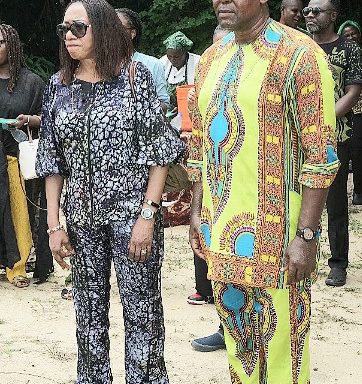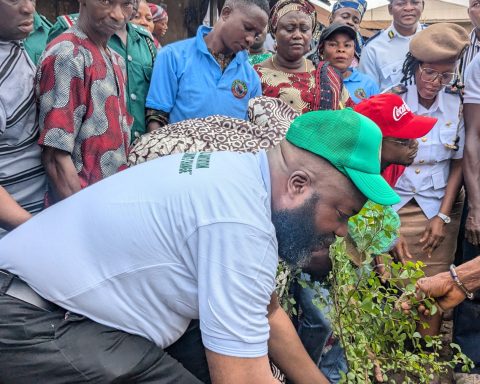
As a leap year bonus, Otunba Olawanle Akinboboye has rolled out, the 53rd tourism product as he promised last week. Nature and Conservation Tourism he said, could be developed as an invaluable part of Nigeria’s overall tourism products portfolio.
He then asked what I knww about Nature Tourism. He mentioned that such tourism is usually defined as “discretionary travel to natural areas that conserves the environmental, social, and cultural values while generating an economic benefit to the local community”.
Nature tourism is all about enjoying undeveloped natural areas and the fauna and flora they contain. It differs from Ecotourism, which is responsible travel to natural areas that conserve the environment and improve the welfare of local people.
However, in recent times, a subset of Nature tourism had developed and is known as ‘conservation tourism’ which is viewed as commercial tourism which makes an ecologically significant net positive contribution to the effective conservation of biological diversity.
He then mentioned that Nigeria has a proliferation of animals and vegetation that could form the basis of a thriving nature/conservatism tourism industry.
Otunba Akinboboye asked, if I am aware that Nigeria has 12 terrestrial eco-regions making it the most ecologically diverse country in West Africa. This also means that Nigeria has the ability to establish and present a variety of bespoke tourism packages that leverages off nature/conservation tourism.

While still on Nigeria’s mammal diversity, Otunba Akinboboye noted that Nigeria has a feature of 90 bat species, 6 of which are classified as Near Threatened while 1 is vulnerable. He also referenced the large bat colony situated within the grounds of Obafemi Awolowo University and the bat colony near the Oba’s Palace in Benin. He noted that the latter is such a part of the city, that local lore viewed the bats as supernatural messengers of the Oba of Benin. He then noted that the forests of Afi Mountain Wildlife Sanctuary and Cross River National Park (Okwangwo Division) in Cross River state also contain a proliferation of bat species.
Otunba Akinboboye mentioned that there are about 290 mammal species and 940 bird species found in Nigeria.
He observed that certain mammals could only be found in Nigeria. These included Sclaters monkey, Niger Delta Red Colobus, Fox’s shaggy rat, Gotel Mountain Soft Furry Mouse, the Savanna White-toothed Swamp Shrew and the Corbet’s Forest Shrew.
He also observed that reptiles including Dunger’s File Snake, the Ibadan Thread Snake, Dunger’s Four- fingered Skink, the Giant Forest Gecko, the Ondo Forest Gecko and the West African Worm Lizard can also only be found in Nigeria.
The fact that these species were unique to Nigeria meant their presence could be marketed to nature lovers and conservationist, who would be eager to see them in their natural habitats, particularly where the tourists are aware that such visits helped to sustain the existence of these unique creatures.
Otunba Akinboboye expressed the view that it is sad that many Nigerians have no idea what animals could be found in Nigeria. For example, he said he is sure I don’t know that African wolves could be found in Northern Nigeria. Although lions were once widespread across Northern Nigeria, today they can only be found in Kainji Lake National Park and Yankari Games Park.
He noted that, with a viable conservation tourism industry, the people currently hunting animals to extinction would realise the benefit of sustaining these animals lives because of other economic benefits that can be gained from their existence. It would also provide employment to people in rural areas, who would be employed as tour guides, conservation officers, trackers and so on.
The country could also commence programmes designed to reintroduce animals that have previously been hunted to extinction like cheetahs, giraffes and rhinos.
Otunba Akinboboye noted that the world is becoming increasingly aware of the need to sustain the planet’s bio – diversity, as each species has its role in sustaining the planet.

People in the developed world are eager to engage in a type of tourism that, provides them with new experiences, and would represent their contribution towards the sustainability of our planet.
Otunba Akinboboye said, according to cognitive market research, the global sustainable tourism market size is estimated to be USD 3.15 trillion by 2025, out of which Africa and the Middle East will earn about 2% of global revenue with a market size of USD 67 billion. In this regard, it is pertinent to mention that in 2022 Kenya earned US $1.8 billion from wildlife tourism.
Otunba Akinboboye emphasized that, with careful packaging and marketing Nigeria could increase its share of the global revenue available in the conservation tourism sector.
In closing, Otunba Akinboboye noted that currently Nigeria makes US $17 billion from tourism. However, he is convinced that, if Nigerian tourism entrepreneurs are able to curate tour packages weaved around specific sectors; including nature / conservation tourism, the country would be able to significantly increase it’s current earnings from the tourism sector.
Tourism would also generate a significant number of jobs in rural areas that could be filled with people irrespective of their level or quality of education .
Otunba Akinboboye signed off by saying how he appreciated the opportunity to share his thoughts on the tourism products that could form part of Nigeria’s tourism Portfolio. He reiterated that in his opinion tourism could become a major revenue earner for Nigerians and that by embracing African tourism we can provide employment to all cadres of Nigerian irrespective of their level of education.

































